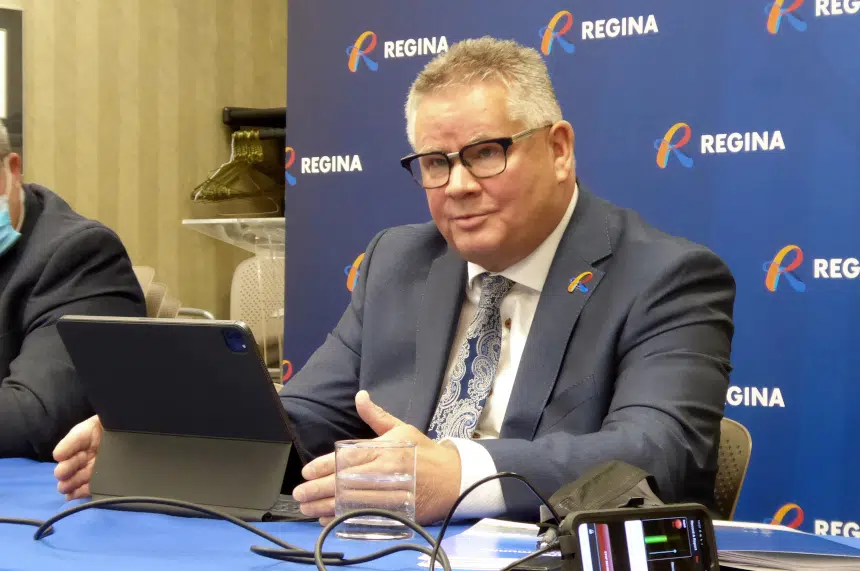The City of Regina could end up taking a bigger chunk out of homeowners’ wallets in 2022.
In the proposed budget for the coming year, city administration is putting up a 3.49 per cent mill rate increase, which would mean an extra $6.31 per month added on to the property taxes for the average home assessed at $315,000.
There would also be a six per cent utility rate increase, which would work out to another $7.25 added on to water bills each month for the average family of four.
Chris Holden, Regina’s city manager, said the city is sensitive to the challenges people and businesses have faced due to the pandemic, but also that costs are increasing and the city is challenged to make sure it can continue to deliver programs and services.
“We look to be as efficient as we can, we look at opportunities to reduce our cost, we look at opportunities to leverage funding from the other orders of government … (and) 3.49 per cent, although it’s a fairly steep increase in terms of per cent when you look at cost per month to the average homeowner, I want to say it’s reasonable,” said Holden.
Furthermore, Holden said if the city doesn’t raise the mill rate, then that loss compounds year over year.
“It just puts us in a position where we would struggle to make the capital investments that we need to make to make sure that we can continue to provide those services,” explained Holden.
City council is expected to discuss and vote on the budget Dec. 16 and 17.
Investments
Holden said that in developing the budget, the city consulted with residents and found that their priorities were “better roads, maintaining infrastructure spending, enhancing recreational/cultural facilities and improving community safety and well-being.”
So, as part of the 2022 budget, the city is investing in “strategic initiatives” like $6.9 million for the recreational/culture capital program and recreation infrastructure program.
Holden said quality of life investments are important and that has become more apparent through COVID.
“(People) walked our streets more, they walked and played in our parks. So there is, I think, an increased expectation and appreciation for our open space, our park space, our sport programs, our culture programs — so that’s why we need to make those investments,” said Holden.
Holden added recreation investments go into Regina being competitive in being somewhere people want to live.
Much of the capital spending in the budget — more than $50 million — is on road infrastructure.
In the proposal, $1.4 million is earmarked for “initiatives that will enhance community safety and well-being for Regina residents.”
A community safety and well-being plan is set to be discussed on Thursday at a special meeting of city council. Barry Lacey, the city’s executive director of financial strategy and sustainability, said there is $875,000 in the budget as incremental new funding for that plan.
Holden said the plan has been in development for over a year, but the process for getting things done under the plan would be similar to what was done to help move Camp Hope to the new emergency shelter — bringing organizations together and then having them come up with new, creative solutions to a problem.
More than $6 million is also set aside in the budget to support the city’s target of being a renewable city by 2050. That money includes the $5.5 million expected to be spent in the coming year in the development of the curbside composting program.
Regina’s police service is asking for $104 million in the budget this year, which is $4 million more than last year. The police budget will be discussed and voted on Dec. 15, which is separate from the main city budget.
A mill rate increase of 0.45 per cent is included in the 2022 budget, as it has been in the last nine. However, that 10-year dedicated mill rate increase to pay for Mosaic Stadium will end in 2022.
Holden said it may not be the end of the conversation around money for the stadium, though.
“There are some gaps in the funding model so there will be future conversations between the province, ourselves, and the (CFL’s Saskatchewan Roughriders) as to ‘What does the 30-year model look like?’ And if there are some funding gaps, then obviously we need to look at how we can fill those,” said Holden.
Utilities
The proposed utility rate increase is five per cent — two of which are being attributed to the plan to accelerate the replacement of lead pipe connections in the city. Three per cent is set to increase operations, maintenance and long-term capital plan for the utility
The increase to the Utility Fund Capital budget is set to be $119 million in 2022. That money includes $42 million for the Eastern Pressure Solution project, which will improve water pressure in the city and take several years to finish.
Utility capital projects also include $10 million to replace and upgrade water meters in the city, which the city said will give real-time information and improve efficiency.
COVID-19
The pandemic is expected to continue affecting the city’s operations in 2022, to the tune of $4.6 million — mostly because of lower transit revenue and lower revenue at recreation facilities.
Lacey said there’s still a lot of uncertainty around COVID as the city looks forward.
“In the proposed budget, the city will use the remaining funding in the COVID-19 Recovery Reserve and funds from the General Fund Reserve to offset the 2022 impact of COVID on the city’s finances,” said Lacey.
More information on the proposed budget can be found on the city’s website.











